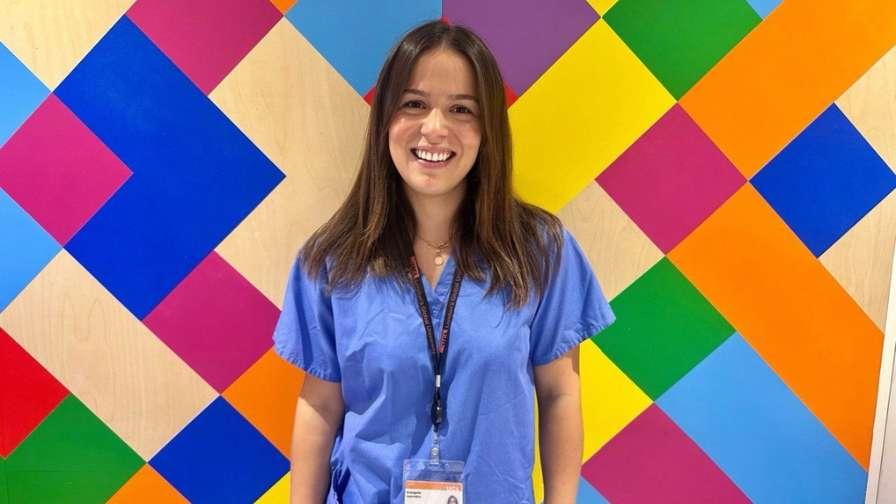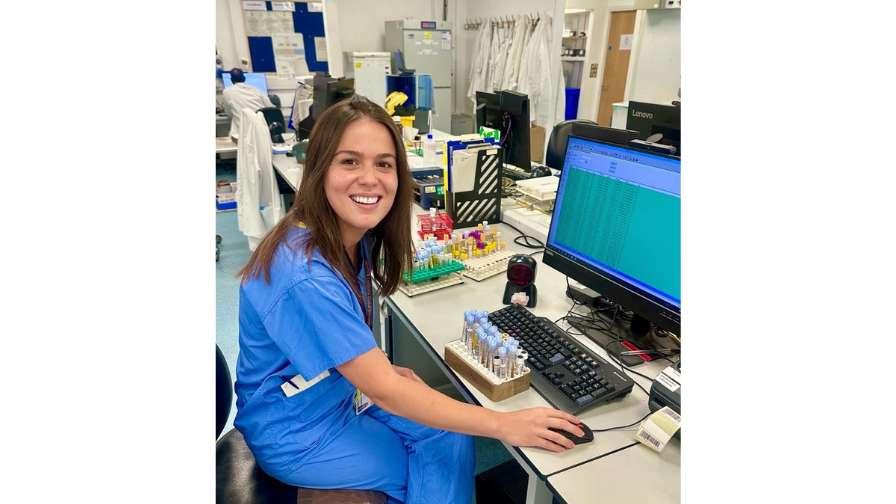Dr Ioannidou is an Action Medical Research and British Paediatric Neurology Association Research Training Fellow.
When and why did you decide to pursue a career in medicine?
The honest answer is that medicine has always felt like a part of me. I can’t recall a time when I considered any other path. For me, there was only ever medicine. What drew me in, and still keeps me grounded, is the mix of science, ethics and real human connection. Medicine is problem solving with purpose – using scientific innovation to make a difference in someone’s life. I’ve never regretted choosing this path.
Medicine is problem solving with purpose – using scientific innovation to make a difference.
At what point did you decide to focus on paediatrics and why?
Seven years ago, during a summer elective at Great Ormond Street Hospital, I attended a complex epilepsy clinic led by Dr Marios Kaliakatsos. Seeing the complexity of the cases, the almost supernatural resilience of the children and their families, and the thoughtful, deeply human approach of Dr Kaliakatsos inspired me. I knew I wanted to focus on paediatric neurology. Now, as I begin a PhD in the same department with him as a supervisor, it feels like things have come full circle.
What inspired you to study Rasmussen’s encephalitis?
My interest in this rare disease began with the stories of previously healthy children whose lives changed overnight. Children who were thriving and then suddenly facing seizures, neurological decline, and the prospect of life-changing brain surgery. Rasmussen’s encephalitis is an example of a disease where epilepsy and neuroimmunology meet, yet these fields have often remained separate. I was struck by that gap and driven by a need to bring them together in a meaningful way.
In rare disease research, every step forward is hard-won. I hope my work will offer children a chance at a different trajectory.

What do you hope your research will achieve?
I hope it will help us to better understand the immune mechanisms underlying Rasmussen’s encephalitis and how they contribute to seizure activity. By identifying early biomarkers, I aim to support earlier diagnosis and pave the way for less invasive treatments. More than anything, I hope this work will offer children a chance at a different trajectory – one that doesn’t end in life-altering surgery.
I hope to create a support group for families, offering some clarity and connection in the uncertainty they face. I also see this as part of a broader journey that will open doors to understanding other epilepsies, where answers are also needed.
What does Action funding mean to you?
In rare disease research, every step forward is hard-won. Progress depends not only on scientific drive, but on belief. Action’s funding is a powerful vote of confidence in a field that’s often overlooked. It allows me to train with a world-class team and focus entirely on the research, without compromise. It means I can build something that reaches beyond the lab, engaging with families and helping to shape a future with fewer unknowns.
What does a typical day look like for you? Or is every day different?
Throughout the course of my project, no two days will be alike – and that’s precisely what draws me to academic medicine. Some days will be spent in the lab, investigating the cellular and molecular underpinnings of disease. Others will focus on patient and public involvement, working to ensure that family perspectives are embedded in the research. There will be days in clinic, and others dedicated to preparing for conferences and sharing our work with both scientific and clinical audiences. It’s a dynamic, multidisciplinary life – and one that reflects the complexity of the questions we’re trying to answer.

Can you tell us a bit about your team?
I’m incredibly fortunate to be supervised by a truly outstanding team. My primary supervisors are Professor Helen Cross, a global authority in paediatric epilepsies whose contributions have shaped international practice, and Professor Tom Jacques, a world-leading paediatric neuropathologist, whose expertise is fundamental to understanding disease mechanisms at tissue level. The supervisory team also includes Dr Amy McTague, a pioneering clinician-scientist at the forefront of neurogenetics; Dr Marios Kaliakatsos, a globally recognised clinician in complex epilepsy and neuroinflammatory disorders and Dr Suresh Pujar, whose work sits at the intersection of acute paediatric neurology and long-term outcomes.
Our work is strengthened by collaborations with global experts from centres across Europe and the United States, creating a network of scientists working towards a common goal. It is a privilege to learn from those who have shaped the field.
You can read more about Dr Eva Ioannidou’s research on our website: www.action.org.uk/rasmussens.
